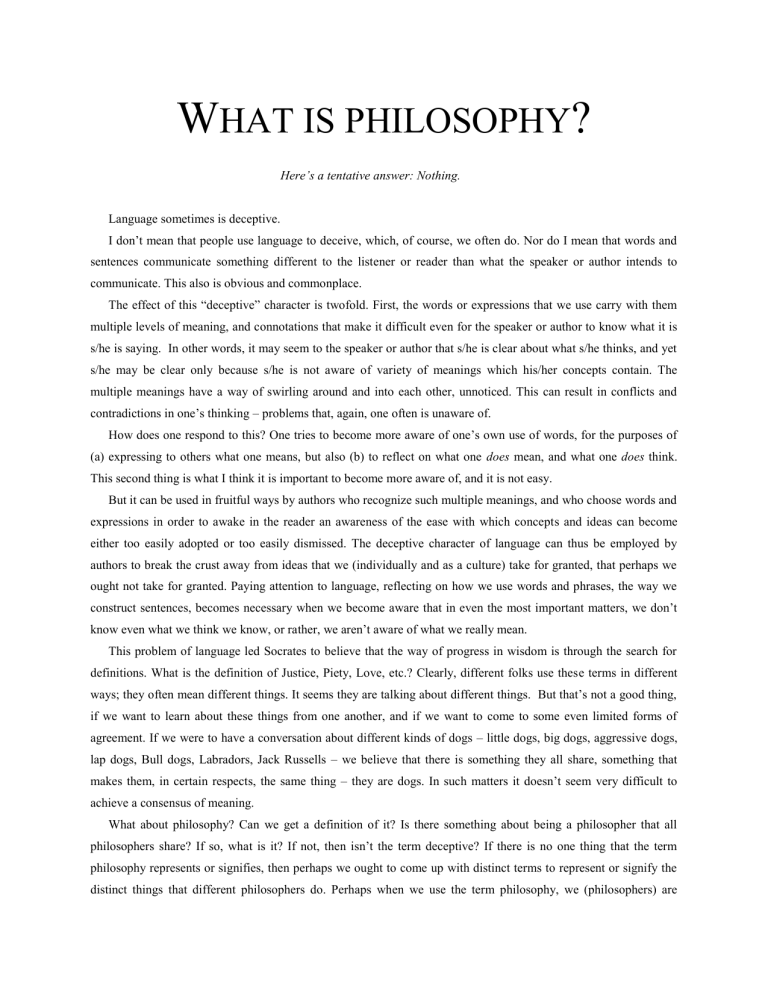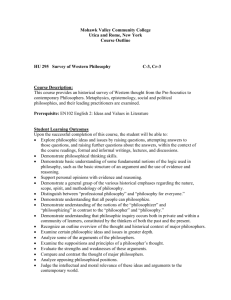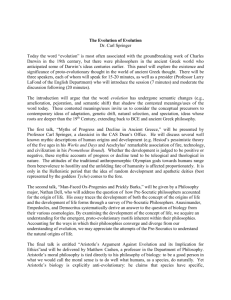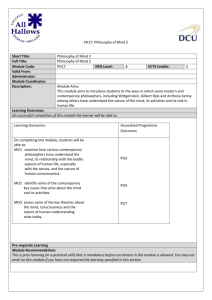Language sometimes is deceptive

W
HAT IS PHILOSOPHY
?
Here’s a tentative answer: Nothing.
Language sometimes is deceptive.
I don’t mean that people use language to deceive, which, of course, we often do. Nor do I mean that words and sentences communicate something different to the listener or reader than what the speaker or author intends to communicate. This also is obvious and commonplace.
The effect of this “deceptive” character is twofold. First, the words or expressions that we use carry with them multiple levels of meaning, and connotations that make it difficult even for the speaker or author to know what it is s/he is saying. In other words, it may seem to the speaker or author that s/he is clear about what s/he thinks, and yet s/he may be clear only because s/he is not aware of variety of meanings which his/her concepts contain. The multiple meanings have a way of swirling around and into each other, unnoticed. This can result in conflicts and contradictions in one’s thinking – problems that, again, one often is unaware of.
How does one respond to this? One tries to become more aware of one’s own use of words, for the purposes of
(a) expressing to others what one means, but also (b) to reflect on what one does mean, and what one does think.
This second thing is what I think it is important to become more aware of, and it is not easy.
But it can be used in fruitful ways by authors who recognize such multiple meanings, and who choose words and expressions in order to awake in the reader an awareness of the ease with which concepts and ideas can become either too easily adopted or too easily dismissed. The deceptive character of language can thus be employed by authors to break the crust away from ideas that we (individually and as a culture) take for granted, that perhaps we ought not take for granted. Paying attention to language, reflecting on how we use words and phrases, the way we construct sentences, becomes necessary when we become aware that in even the most important matters, we don’t know even what we think we know, or rather, we aren’t aware of what we really mean.
This problem of language led Socrates to believe that the way of progress in wisdom is through the search for definitions. What is the definition of Justice, Piety, Love, etc.? Clearly, different folks use these terms in different ways; they often mean different things. It seems they are talking about different things. But that’s not a good thing, if we want to learn about these things from one another, and if we want to come to some even limited forms of agreement. If we were to have a conversation about different kinds of dogs – little dogs, big dogs, aggressive dogs, lap dogs, Bull dogs, Labradors, Jack Russells – we believe that there is something they all share, something that makes them, in certain respects, the same thing – they are dogs. In such matters it doesn’t seem very difficult to achieve a consensus of meaning.
What about philosophy? Can we get a definition of it? Is there something about being a philosopher that all philosophers share? If so, what is it? If not, then isn’t the term deceptive? If there is no one thing that the term philosophy represents or signifies, then perhaps we ought to come up with distinct terms to represent or signify the distinct things that different philosophers do. Perhaps when we use the term philosophy, we (philosophers) are
deceiving ourselves and others (students), leading ourselves into believing that we are something that we are not.
For example, there are a number of philosophical traditions and topics that I have so little understanding of, that it makes me wonder just what we share as philosophers. Some philosophy journals and books contain far more mathematical and logical symbols than they do prose, and many philosophers would be unable to follow the arguments presented. Furthermore, many philosophers believe that the issues that other philosophers deal with are not only confused, but are senseless – they have no meaning at all! For example, philosophers of the logical empiricist tradition think that Martin Heidegger’s talk of “Being” and “non-being” is without any meaning at all.
Logical empiricists don’t merely claim that they don’t understand what Heidegger is talking about, they claim that
Heidegger doesn’t know what Heidegger is talking about. Even stronger, they don’t believe that Heidegger can know what Heidegger is talking about, because he isn’t talking about anything at all.
Some philosophers believe that the study of philosophy brings wisdom, or at least can bring wisdom. They suggest that through philosophy, one can develop insight into the nature of being human, into the existence and nature of God, into how we ought to behave, into the nature of beauty, and many other things besides. In other words, some philosophers believe that one can come to know about some of the most significant characteristics of our world and ourselves (perhaps non-scientifically). There are other philosophers who believe that no such wisdom is possible, and the task of philosophy is much more narrow – that it only can allow us to gain clarity in our use of words.
In summary, the term “philosophy” refers to the tasks or work of philosophers. But there are so many traditions of philosophy, so many different topics covered, so many different methods which different philosophers use, so many purposes and goals that philosophers think that philosophy can have, so many vocabularies, languages, and jargon that it is a legitimate question whether the term “philosophy” or “philosopher” can mean one thing. Perhaps we need a term to represent logical empiricists, and an entirely different term to represent those who do philosophy of religion, or philosophy of art. Perhaps, even, “philosophy of …” is a misnomer – perhaps it stands in front of
“…religion” “…art” etc. simply because we have no other word to begin those phrases. If this is the case, then perhaps the term “philosophy” is deceptive, in the sense brought up earlier – it leads the reader or listener to believe that there is something that the word depicts, when in fact there is nothing at all that it depicts. If this is right, might it be that there is no such thing as philosophy?
At the end of your first semester in philosophy, you ought to reflect back on your experience of the class.
Reflect on materials you’ve read, on the discussions you’ve had in class, those with the teacher, with other students, with friends or parents, and try to answer the question: what, if anything, is philosophy? And perhaps even more importantly, if you cannot answer that question, do you think that the question is an important one? Do you think that that question needs to be answered in order to explore the things that “philosophers” explore? To read the works
“philosophers” write? To ask the questions that “philosophers” ask?






